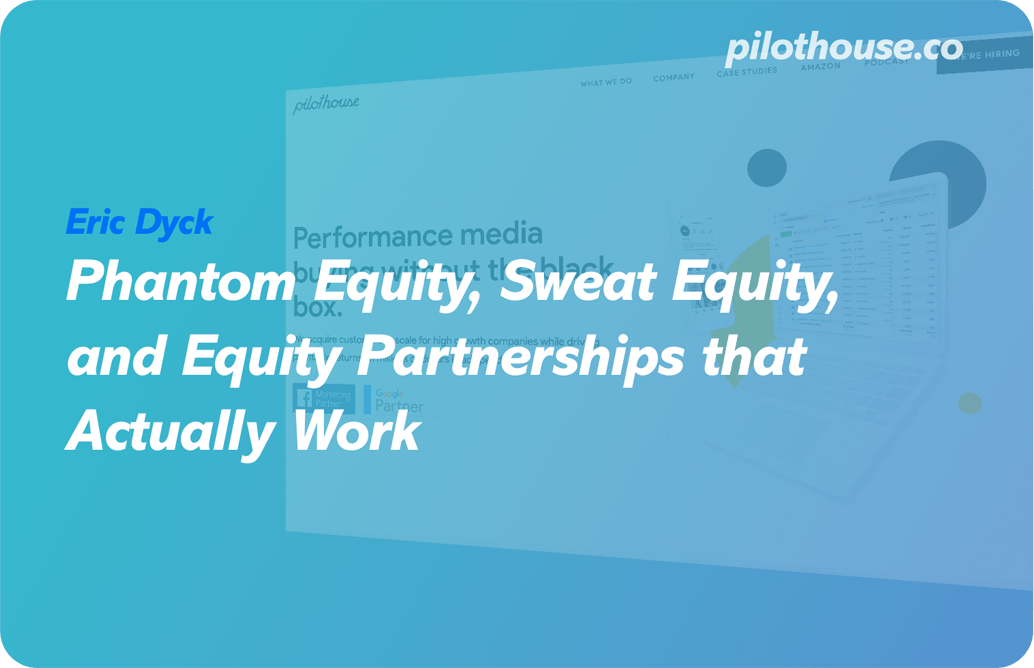One of the things that subscribers to the Rich Ad, Poor Ad podcast find most valuable is hearing about the real life financial lessons that agency owners and entrepreneurs have learned the hard way.
It’s the kind of raw honest stuff that you rarely find in typical online profiles

That’s what we got when Eric Dyck, Director of Content at Pilothouse Digital and co-founder of the DTC Newsletter that serves direct-to-consumer businesses, joined us on a recent episode of the podcast.
In addition to talking about generating content, and influencer marketing, he opened up about how he creates win-win equity deals with new partners.
Something I know that’s a constant struggle among entrepreneurs and high level experts they might want to bring in.
Dyck started with the horror-story red flags and then outlined a new paradigm that works for everyone.
Avoid “phantom equity” like the plague.
“Phantom equity is basically equity that doesn't exist until the event of a sale. It's a kind of equity that collapses into existence in the event of a sale based on an evaluation of the role and the value that your piece played in the sale.

There are some interesting people that try to get really creative with phantom stock, where it's just like, ‘Hey, Eric, you're putting in six figures of value of sweat equity into this. And we don't want you to have a tax event by us granting you equity. And we don't want you to give you an option because you're more valuable than just having the option.’
I'll say it definitely ghosted on me in the past. I was involved in one of my enterprises where I had phantom equity. And ultimately there's no hard feelings because the company did not ever achieve the level of profitability over time where the equity would have manifested into being worth something.
This time there's a different approach. It’s basically good faith equity granted from what's already been achieved and acquired. Having that right out of the gate and then setting basic milestones to achieve the rest is really important to me. So, they're ones that I'm fully in agreement with and believe I can crush and all these things.”
Work to build equity together.
“The reason things are working so well with Pilothouse is that I didn't have to build DTC Newsletter from nothing and have it be a total negative on the balance sheet. Because ever since I started it, it was already providing measurable value with the business development.

So it was a really cool opportunity to just start this business inside of this growing business that provided so much value that it doesn't affect my eventual equity position.
And, and so now it's gonna be able to spit out on its own and still provide value, but figure out a way to be properly compensated.
That's the one thing we're trying to figure out right now is like, what is a conversation with Unilever worth?
Or, like what if once this becomes a new company, how do we continue to incentivize it to be a business development engine for the agency?
I knew I could provide a lot of value. I was interested in having an equity conversation about Pilothouse, even when they were like 18 employees. They were doing really well at that time.
But when I had my very first conversation with Dave Steele, the CEO, he was like instead of talking about how you can get a piece of equity at Pilothouse, why don't we talk about building equity together?
Why don't we talk about building more equity? And so that's kinda what we're trying to bring with Pilothouse. Whether it's hiring entrepreneurs -- and we want tocontinue to be able to do that -- but then we want to find ways and be able to build systems where we can build equity.”

The average small business has 5 credit cards with a balance of about $32k that they have to keep track of. There’s a better way than rotating through dozens of low limit credit cards to get the funding you need to scale when you can get it all with AdCard -- the best card for Facebook ads with the high limits and more you need to grow your business.
Exclusive Cardholder Benefits


